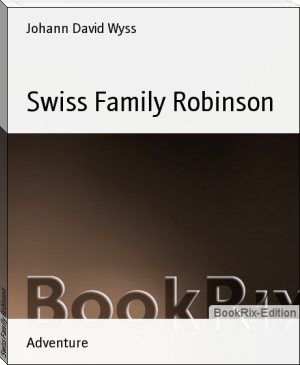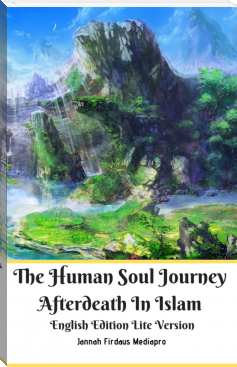Swiss Family Robinson - Johann David Wyss (poetry books to read txt) 📗

- Author: Johann David Wyss
- Performer: -
Book online «Swiss Family Robinson - Johann David Wyss (poetry books to read txt) 📗». Author Johann David Wyss
to the attack of even savages, should they appear. Not satisfied with
this, however, we fortified the bridge, and on a couple of hillocks
mounted two guns which we brought from the wreck, and with whose angry
mouths we might bark defiance at any enemy, man or beast.
Six weeks slipped away while we were thus busily occupied, six weeks of
hard yet pleasant labour. We greeted each Sunday and its accompanying
rest most gratefully, and on that day always especially thanked God for
our continued health and safety.
I soon saw that this hard work was developing in the boys remarkable
strength, and this I encouraged by making them practise running,
leaping, climbing, and swimming; I also saw, however, that it was
having a less satisfactory effect upon their clothes, which, though a
short time before remarkably neat, were now, in spite of mending and
patching, most untidy and disreputable.
I determined, therefore, to pay another visit to the wreck, to
replenish our wardrobe and to see how much longer the vessel was
likely to hold together. Three of the boys and I went off in the
pinnace. The old ship seemed in much the same condition as when we had
left her, a few more planks had gone, but that was all.
`Come, boys,’ cried I, `not an article of the slightest value must be
left on board; rummage her out to the very bottom of her hold.’
They took me at my word: sailors’ chests, bales of cloth and linen, a
couple of small guns, ball and shot, tables, benches, window shutters,
bolts and locks, barrels of pitch, all were soon in a heap on the deck.
We loaded the pinnace and went on shore.
We soon returned with our tub-boat in tow, and after a few more trips
nothing was left on board.
`One more trip,’ said I to my wife, before we started again, `and
there will be the end of the brave ship which carried us from
Switzerland. I have left two barrels of gunpowder on board, and mean to
blow her up.’
Before we lighted the fuse, I discovered a large copper cauldron which
I thought I might save. I made fast to it a couple of empty casks, that
when the ship went up it might float. The barrels were placed, the
train lighted, and we returned on shore.
The supper was laid outside the tent, at a spot from whence we might
obtain a good view of the wreck. Darkness came on. Suddenly a vivid
pillar of fire rose from the black waters, a sullen roar boomed across
the sea, and we knew that our good old ship was no more.
We had planned the destruction of the vessel, we knew that it was for
the best; and yet that night we went to bed with a feeling of sadness
in our hearts, as though we had lost a dear old friend.
Next morning all our sadness was dispelled, and it was with pleasure
that we saw the shore lined with a rich store of planks and beams, the
remnants of the wreck. I soon found, too, the copper cauldron which was
successfully floated by the casks; this I got on shore, and hauling it
up among the rocks, stored under it the powder casks we had landed the
day before.
Collecting all these valuables gave us some little trouble, and while
we were thus engaged my wife brought us good news. She had discovered
that two ducks and a goose had each reared a large family among the
reeds by the river; and they presently appeared waddling past us,
apparently vastly well-pleased with their performance. We greeted them
joyfully.
`Hurrah!’ cried Ernest. `We’ll be able to afford duck and green peas
some day soon, and imagine we’re once more civilized mortals.’
The sight of these birds reminded me of our family at Falconhurst, and
I announced my intention of paying them a visit.
Everyone was delighted, and everyone would come with me. As we
approached Falconhurst I noticed that several young trees in our
avenue were considerably bent by the wind, and this resolved me to make
an expedition next day to cut bamboos for their support.
As Fritz was the only one besides myself who had visited Cape
Disappointment and the surrounding country, my wife and the younger
boys begged hard to be allowed to accompany me. I consented; and next
morning we started, bringing with us the cart, drawn by the cow and
ass, and laden with everything necessary for an expedition of several
days—a tent, provisions, a large supply of ammunition, and all sorts
of implements and utensils; for I intended to make a great collection
of fruits and the produce of different trees.
It was a lovely morning, and passing gaily through the plantations of
potatoes, manioc and cassavas, we came to the nests of the sociable
grosbeak, the sight of which charmed the children immensely.
We reached the wax trees, and there I called a halt, for I wished to
gather a sack or two of the berries that we might renew our stock of
candles. The berries were soon plucked; and I stored them away amongst
the bushes, marking the spot that we might find them on our return.
`Now for the caoutchouc tree,’ said I, `now for waterproof boots and
leggings to keep your feet dry, Ernest.’ To the caoutchouc tree we
directed our steps, and were soon busily engaged in stabbing the bark
and placing vessels beneath to catch the sap.
We again moved forward; and, crossing the palm wood, entered upon a
delightful plain bounded on one side by an extensive field of waving
sugarcane, on the other by a thicket of bamboos and lovely palms,
while in front stretched the shining sea, calm and noiseless.
`How beautiful!’ exclaimed Jack. `Let us pitch our tent here and stay
here always instead of living at Falconhurst. It would be jolly.’
`Very likely,’ replied I, `and so would be the attacks of wild beasts;
imagine a great tiger lying in wait in the thicket yonder, and pouncing
out on us at night. No, no, thank you, I much prefer our nest in the
tree, or our impregnable position at Tentholm. We must make this our
headquarters for the present, however; for, though perhaps dangerous,
it is the most convenient spot we shall find. Call a halt and pitch the
tent.’
Our beasts were quickly unyoked, the tent arranged, a large fire lit,
supper prepared, and we dispersed in various directions, some to cut
bamboos, and some to collect sugarcane. We then returned; and, as
supper was still not quite ready and the boys were hungry, they decided
to obtain some cocoanuts. This time, however, no assistance was to be
had from either monkeys or land-crabs, and they gazed up with longing
eyes at the fruit above them.
`We can climb,’ said Fritz, `up with you, boys.’ Jack and he each
rushed at one of the smooth slippery trunks; right vigorously they
struggled upwards, but to no purpose; before they had accomplished one
quarter of the distance they found themselves slipping rapidly to the
ground.
`Here, you young athletes,’ cried I, `I foresaw this difficulty, and
have provided for it.’ So saying I held up buskins of shark’s skin
which I had previously prepared, and which I now bound on to their
legs. Thus equipped they again attempted the ascent, and with a loop of
rope passed round their body and the trunk of the tree, quickly reached
the summit.
My wife joined me, and together we watched the boys as they ascended
tree after tree, throwing down the best fruit from each. They then
returned, and jestingly begged Ernest to produce the result of his
labour. The professor had been lying on the grass gazing at the palms;
but, on this sarcastic remark, he sprang to his feet. `Willingly,’ he
exclaimed, and seizing a pair of buskins he quickly donned them.
`Give me a cocoanut shell,’ said he. I gave him one, and he put it in
his pocket. He ran to a tree, and, with an agility which surprised us
all, quickly reached the top.
No sooner had he done so than Fritz and Jack burst into a roar of
laughter. He had swarmed a tree which bore no nuts. Ernest apparently
heard them; for, as it seemed in a fit of anger, he drew his knife and
severed the leafy crest, which fell to the ground. I glanced up at him,
surprised at such a display of temper. But a bright smile greeted me,
and in a merry tone he shouted:
`Jack, pick that palm-cabbage up and take it to father; that is only
half my contribution, and it is worth all your nuts put together.’
He spoke truly: the cabbage-palm is rare, and the tuft of leaves at its
summit is greatly prized by the South Americans for its great delicacy
and highly nutritive qualities.
`Bravo!’ I cried. `You have retrieved your character; come down and
receive the thanks of the company, what are you waiting up there for?’
`I am coming presently,’ he replied, `with the second half of my
contribution; I hope it will be as fully appreciated as the first.’ In
a short time he slipped down the tree, and, advancing to his mother,
presented her with the nutshell he had taken up with him.
`Here,’ he said, `is a wine which the greatest connoisseur would
prize. Taste it, mother.’
The shell was filled with a clear rosy liquor, bright and sparkling.
My wife tasted it. `Excellent, excellent,’ she exclaimed. `Your very
good health, my dear boy!’
We drank the rosy wine in turn, and Ernest received hearty thanks from
all.
It was getting late, and while we were enjoying our supper before our
tent, our donkey, who had been quietly browsing near us, suddenly set
up a loud bray, and, without the least apparent cause, pricked up his
ears, threw up his heels, and galloped off into the thicket of bamboos.
We followed for a short distance, and I sent the dogs in chase, but
they returned without our friend, and, as it was late, we were obliged
to abandon the chase.
I was annoyed by this incident, and even alarmed; for not only had we
lost the ass, but I knew not what had occasioned his sudden flight. I
knew not whether he was aware, by instinct, of the approach of some
fierce wild beast. I said nothing of this to my family, but, making up
an unusually large fire, I bade them sleep with their weapons by their
sides, and we all lay down.
A bright morning awoke us early, and I rose and looked out, thinking
that perhaps our poor donkey might have been attracted by the light of
the fires, and have returned. Alas, not a sign of him was to be seen.
As we could not afford to lose so valuable a beast, I determined to
leave no attempt untried to regain him.
We hurriedly breakfasted, and, as I required the dogs to assist me in
the search, I left my elder sons to protect their mother, and bade Jack
get ready for a day’s march. This arrangement delighted him, and we
quickly set out.
For an hour or more we trudged onwards, directed by the print of the
ass’s hoofs. Sometimes we lost the track for a while, and then again
discovered it as we reached softer soil. Finally this guide failed us
altogether, for the donkey seemed to have joined in with a herd of some





Comments (0)